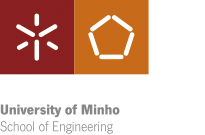Thursday, 9/29/2016
In 2016, the Production and Systems area celebrates 40
years since its creation, in 1976, in the framework of the University of
Minho’s organic structure. Commemorations will be held throughout the year.
ENGINews talked to the current director of the Department of Production and
Systems (DPS) of the EEUM, Professor José Valério de Carvalho.
The Production and Systems Area was created in 1976,
in the framework of the definition of the University of Minho’s organic
structure, according to the Provisional Internal Regulation of the University
of Minho, approved by an official decree of the Secretary of State for Higher
Education and Scientific Research, on the 10th February 1976. This
decree formally created Engineering as a Pedagogical Unit of the University. Engineering
education had started already at the University of Minho, through the
Scientific-Pedagogical Unit of Exact Sciences and Technologies, although the
first reference to “Production and Systems” is only from 1976.
The University’s structure, with its organic units
created only temporarily, was maintained during the University’s installation
period (with a few adaptations) until the formal statute publication in 1989.
The area designation then changed to Department of Production and Systems (DPS)
of the School of Engineering of the University of Minho.
ENGINews talked to the current director of the
Department of Production and Systems (DPS) of the EEUM, Professor José Valério
de Carvalho.
Can you tell us about the
evolution of the Production and Systems area, from its creation to nowadays?
The profile of an industrial engineer is well defined
internationally, and does not change. We prepare students to design, develop,
implement and improve integrated systems which include people, materials,
information, equipment and energy, providing students with an analytical,
computational and experimental practical component for that purpose. One of the
largest challenges we face is to do it according to the current era. We are now
at a time that, not long ago, has seen the launching of the strategic
initiative Industry 4.0, who many anticipate will lead to the fourth industrial
revolution. This is a completely new reality. Basically, Industry 4.0 involves
the technical integration of cyber-physical systems in manufacturing and
logistics, as well as the use of Internet of Things and Services in industrial
processes. Major implications in creating value, business models and work
organisation itself will emerge, and our students must be prepared to face this
reality.
At the DPS, we gather the conditions to start this
challenge. One of the positive evidences of this is that the scientific areas
at the DPS generally match the working groups for the Industry 4.0 initiative.
How does Production and Systems contribute to
daily life?
Our
goal is to increase system efficiency, using resources as rationally as
possible, either through system optimisation or through innovation. This aims
at increasing productivity to make daily life better, or easier.
One
of the classical examples is the Manchester triage system, used at hospitals’
emergency rooms. The system was designed by industrial engineers and it shows
that, apart from industrial applications, Production and Systems’ principles
may be applied to services.
Another
example of optimisation is the operations’ planning for airlines. When
companies first started using this system, the air ticket prices dropped in
real terms. Although this is a complex system, involving people, airplanes and
many constraints, it is possible to find plans translating into large economies.
I know of a case in which optimisation allowed a reduction of 17% in the
operation costs of a large European airline company.
Who are the main individualities you would
point out in the departments’ affirmation and its activity policy?
It
is not easy to single out someone. I would refer to Professor Romero, for his
role in introducing this scientific area in Portugal in such a structured
manner, and also Professor Guimarães Rodrigues, for his vision in directing and
supporting the department. Notwithstanding, every day I see colleagues of mine,
staff and present and former students with commitment, dedication and “talant
de bien faire”. I am certain we can all contribute towards a brighter future
and be part of the affirmation of the Industrial Management and Engineering.
You have mentioned a great challenge for DPS.
What other challenges does DPS currently face?
There
are many and distinct challenges. One of them is the accreditation of our
programme by international entities. The Integrated Master Programme in
Industrial Management and Engineering is accredited by A3ES for the maximum
time frame allowed. However, we need to go further, as the University of Minho and
the School of Engineering are part of the European area. We need to be renowned
in this area. Other challenge is teaching in English, in order to increase the
attractiveness of our programmes to Erasmus students. There are many more… We
will be around for the next 40 years.
The Commemorative Day of the Department of Production
and Systems, on the 18th February 2016, started the celebration of
the 40 years of Production and Systems at the University of Minho. Throughout
the year, the department organised several thematic events opened to the
public, such as the Innovation
Week (22nd to 26th February), the
Operational
Research Week (11th to 17th
March), the Industrial
Statistics Week (8th to 15th
April). The Workshop
in Project Management took place on the 6th May.
For the next few months, the department will also
organise the Industrial
Management Week (24th to 28th October) and the Quality Week (4th
to 10th November).
+ Info: www.dps.uminho.pt

